HomeFeaturesCyber Knights: Flashpoint
Rally Point: Cyber Knights: Flashpoint is both worth playing, and worth waiting for a little longerCyber Cyber, turning fight
Cyber Cyber, turning fight
Image credit:Rock Paper Shotgun/Trese Brothers
Image credit:Rock Paper Shotgun/Trese Brothers
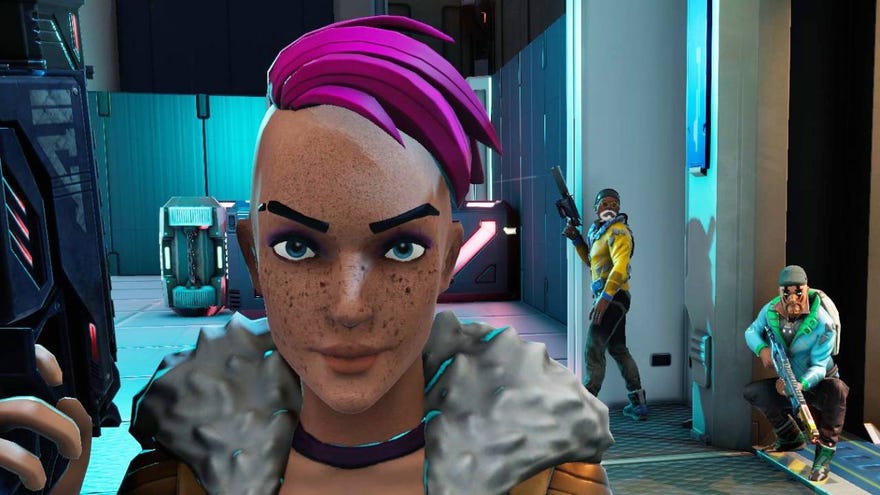
Cyber Knights Colon Flashpointdoes not lead with its best foot. This is easier to shrug off while it’s still in early access, but I will confess some relief when Ireadthat the Trese Brothers (It’s pronounced “Trese”) nudged their estimated release date back to 2025. It needs a bit longer. But I’m about ready to start recommending it.
You start out with too many decisions, too little context, and a brief tutorial mission in which your player character and crew break out of a lab where you’ve just learned to touch type, thus becoming a Cyber Knight according to my granddad when he again asks how to attach a youtube. It doesn’t really represent how most missions work, or dispel many assumptions. I sympathise to an extent, because CKF is rather unorthodox.
Image credit:Rock Paper Shotgun/Trese Brothers
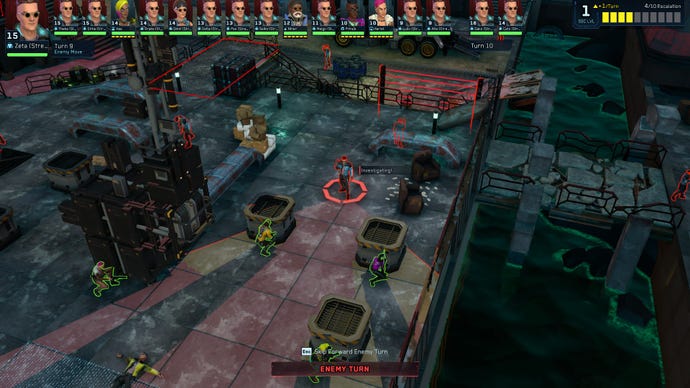
It’s not an XCOM. Instead of strict grids, you move at the exact angle and distance you choose, split freely between running and the noble crouch-jog, and shoot/act/move in whatever order you please. Turns depend on individual initiative rolls, and movement and lines of sight/aim are consequently far more granular (and a little unpredictable, as it tradition). It hasn’t the ballistic simulation focus ofSilent StormorJagged Allianceeither. Missed shots effectively evaporate on leaving the barrel, and though it uses a similaroverwatch system, there’s none ofPhoenix Point’s limb-severing or headshotting. Character statistics are downplayed in favour of perk unlocks, but shootouts nonetheless feel like shootouts - raw firepower is your bedrock, giving open confrontations a more grounded atmosphere than the usual XCOMalong superpower metagaming.
With a stealth game I tend to assume that the ideal is to be invisible, that any alert brings shame upon my house. But these are notInvisible Inc.’s artful dodgers. You’re a street gang, and though it’s not all that punk politically, CKF absolutely expects your cyberpunks to crack a lot of heads.
Image credit:Rock Paper Shotgun/Trese Brothers
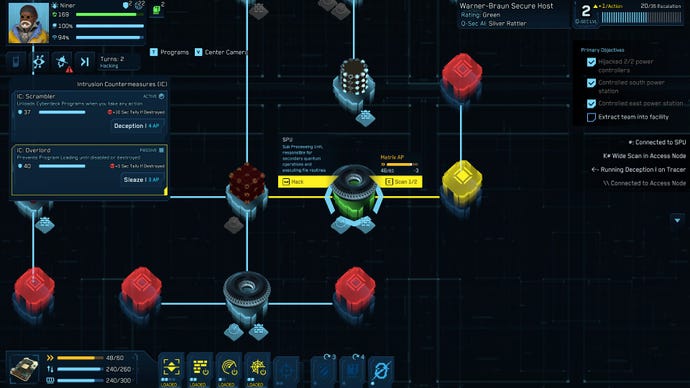
You’ll learn to exploit alarms. Step under a camera and splat the guard who comes to investigate. Have your soldier start blasting, raising a lot of security but drawing guards away so your unseen vanguard can ransack a cupboard. Excellently, guards can only raise alarms if they’re alive at the turn’s end. There’s no dedicated ambush button, but multiple path-predicting and initiative-manipulating perks, and anyone can delay part of their turn, allowing a sufficiently prepared team to loudly hammer multiple guards and get away with it. Which makes it frustrating that it’s not always clear exactly where some potential alarm came from.
It’s also possible, through hacking, to dial alert back (and scrape out more loot) via a detailed minigame. It’s engaging enough, but a little lacklustre in terms of drama or effect on the wider mission. Occasionally it causes mini-sieges as everyone protects your hacker for several turns while they open a door, or tempts you into risking more exposure to root out those last valuable files. Kicking up a high alert like this isn’t as devastating as it seems, though. Causing enough chaos raises “heat” back at base, which in extremes can draw bounty hunters into invading subsequent jobs, but building the right facilities and laying low a while cools it off.
The design goal is, I think, to represent stealth as vital, but not the entirety of your tactics. If you’re feeling spicy you can hit a job loud, counting on speed and firepower over waiting for the sentry to chase the shiny penny. Almost all gunfights should feature rolling, repositioning, moving towards a target or shooting your way out before reinforcements catch up. Rather than a stealth/combat binary there’s room for degrees of both, sometimes simultaneously.
Image credit:Rock Paper Shotgun/Trese Brothers
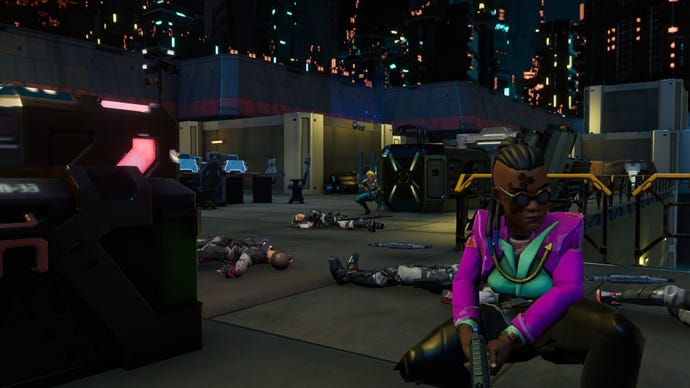
Points gained as characters level can add a perk to their repertoire, enhance an earlier one, or instead go on the attribute bonuses that link each perk on each class’s unique, somewhat non-linear tree. Classes determine not just which attributes can go up, but add different bonuses on top. A soldier’s +1 to Will raises her hit points, but the sniper’s Will raises critical hit chance instead. Between dozens of perks and easy multiclassing, there’s more room for designing the utra-optimised, the ready for anything, or the chaotic obscure trick shot characters the longer you play. This means you can build a weird and messy team even before adding cybernetic implants or crafting advanced weapons. Those implants are disappointingly numerical at present, though future ones will apparently include grafted weapons. No word yet on the skull gun.
Characters define how CKF plays off the job, too, as you gradually build up an empty headquarters. There’s no strategic map here, no bulletin board or exclamation mark hats. Instead, you have underworld contacts. As with Star Traders, contacts offer services, rise or fall in influence, and carry personality traits, loyalties, and liabilities. Your every job comes from a specific person offering money or favours, or calling one in. Refusing an obligation might burn the bridge and alienate their friends, and there’s no guarantee a rising star you’ve backed won’t get got. Many have relationships with someone on your own team, too, who have their own loyalties and pasts.
It’s intended, I think, to paint a world likeBloodnetor evenGothic: a favour economy where trust matters more than money. This is literally true to an extent, as favours can be called in for unbuyable access to services or assistance on important jobs. Meanwhile, your base has no running costs, as your people take a pirate-style cut of contract payouts instead. So far though, this side is lacking. There’s little room to define your team’s vibe or ideology, and your Cyber Knight often comes across as kind of a dick. In principle, all your team will have some history, so new hires mean deciding who you’re willing to cross, which favours you’re willing to pay back. In practice I saw little difference between factions or their opinions, and I couldn’t be proactive. Job offers are clearly generated from relationships, but I can only wait for them to come in, with (almost) no ability to create my own opportunities, offer someone an olive branch, or poison someone’s olives.
Image credit:Rock Paper Shotgun/Trese Brothers
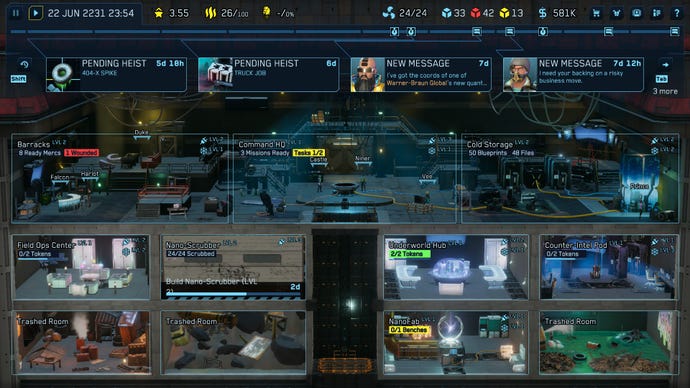
I should also admit that CKF is too sturdy to qualify as “janky”. Production values are not the studio’s strongest suit, and the jump to their first 3D game has cost some visual style. “Budget charm” is the phrase I want to lean on, but its levels do little to stir the imagination, and its dialogue is fine. Even the (incomplete) fashions lean into an unmoving chunky Soldier Guy / neon spandex duality. It’s thankfully not po-faced, edgy, or smugly ironic, but lacks the defining vibe of being cheesy or melodramatic or intense, or just…something, you know? This is not a world I think about when I’m not playing, or even very much when I am. The small crews and cyberpunk setting ought to lend your character more fire, more humanity (or disturbingly less).